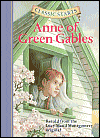


Aunt Abigail laughed, took up the paddle, and after three or four passes the butter was a smooth, yellow ball. "Well, that brings it all back to me!" she said— "when I was a little girl, when my grandmother first let me try to make a pat. I was about five years old— my! what a mess I made of it! And I remember—doesn't it seem funny—that she laughed and said her Great-aunt Elmira had taught her how to handle butter right here in this very milk-room. Let's see, Grandmother was born the year the Declaration of Independence was signed. That's quite a while ago, isn't it? But butter hasn't changed much, I guess, nor little girls either."
Elizabeth Ann listened to this statement with a very queer, startled expression on her face, as though she hadn't understood the words. Now for a moment she stood staring up in Aunt Abigail's face, and yet not seeing her at all, because she was thinking so hard. She was thinking! "Why! There were real people living when the Declaration of Independence was signed—real people, not just history people—old women teaching little girls how to do things—right in this very room, on this very floor—and the Declaration of Independence just signed!"
To tell the honest truth, although she had passed a very good examination in the little book on American history they had studied in school, Elizabeth Ann had never to that moment had any notion that there ever had been really and truly any Declaration of Independence at all. It had been like the ounce, living exclusively inside her schoolbooks for little girls to be examined about. And now here Aunt Abigail, talking about a butter-pat, had brought it to life!
Of course all this only lasted a moment, because it was such a new idea! She soon lost track of what she was thinking of; she rubbed her eyes as though she were coming out of a dream, she thought, confusedly: "What did butter have to do with the Declaration of Independence? Nothing, of course! It couldn't!" and the whole impression seemed to pass out of her mind. But it was an impression which was to come again and again during the next few months.

"I hope you won't have occasion to make many more such apologies. I hope you'll try to control your temper now, Anne."
"That wouldn't be so hard if people wouldn't twit me about my looks," said Anne with a sigh. "I don't get cross about other things; but I'm so tired of being twitted about my hair and it just makes me boil right over. Do you suppose my hair will really be a handsome auburn when I grow up?"
"You shouldn't think so much about your looks, Anne. I'm afraid you are a very vain little girl."
"How can I be vain when I know I'm homely?" protested Anne. "I love pretty things; and I hate to look in the glass and see something that isn't pretty. It makes me feel so sorrowful--just as I feel when I look at any ugly thing. I pity it because it isn't beautiful."
"Handsome is as handsome does," quoted Marilla. "I've had that said to me before, but I have my doubts about it," remarked skeptical Anne, sniffing at her narcissi. "Oh, aren't these flowers sweet! It was lovely of Mrs. Lynde to give them to me. I have no hard feelings against Mrs. Lynde now. It gives you a lovely, comfortable feeling to apologize and be forgiven, doesn't it? Aren't the stars bright tonight? If you could live in a star, which one would you pick? I'd like that lovely clear big one away over there above that dark hill."
"Anne, do hold your tongue." said Marilla, thoroughly worn out trying to follow the gyrations of Anne's thoughts.
Anne said no more until they turned into their own lane. A little gypsy wind came down it to meet them, laden with the spicy perfume of young dew-wet ferns. Far up in the shadows a cheerful light gleamed out through the trees from the kitchen at Green Gables. Anne suddenly came close to Marilla and slipped her hand into the older woman's hard palm.
"It's lovely to be going home and know it's home," she said. "I love Green Gables already, and I never loved any place before. No place ever seemed like home. Oh, Marilla, I'm so happy. I could pray right now and not find it a bit hard."
Something warm and pleasant welled up in Marilla's heart at touch of that thin little hand in her own--a throb of the maternity she had missed, perhaps. Its very unaccustomedness and sweetness disturbed her. She hastened to restore her sensations to their normal calm by inculcating a moral.
"If you'll be a good girl you'll always be happy, Anne. And you should never find it hard to say your prayers."
"Saying one's prayers isn't exactly the same thing as praying," said Anne meditatively. "But I'm going to imagine that I'm the wind that is blowing up there in those tree tops. When I get tired of the trees I'll imagine I'm gently waving down here in the ferns--and then I'll fly over to Mrs. Lynde's garden and set the flowers dancing--and then I'll go with one great swoop over the clover field--and then I'll blow over the Lake of Shining Waters and ripple it all up into little sparkling waves. Oh, there's so much scope for imagination in a wind! So I'll not talk any more just now, Marilla."
"Thanks be to goodness for that," breathed Marilla in devout relief.